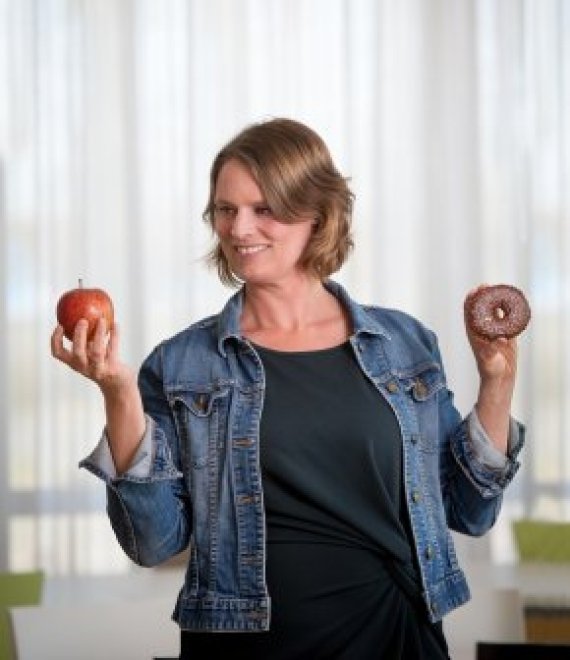The context of our eating habits has changed a lot in recent decades. Food is for sale in more and more places, all day long. Portions are bigger too, and there is more choice. Very many of those choices are tempting but fattening: fatty, sweet and highly calorific snacks. Experts have dubbed our current social environment ‘obesogenic’, or fattening. This is reflected in coke bottles, for instance. In the nineteen fifties they held 0.75 litres; now they are sold in plastic-wrapped multipacks of two-litre bottles. And there is no sign of a change. Emely de Vet is interested in how people, and especially young people, can resist all these temptations.
Can you put up resistance as an individual if nothing changes in our environment?
‘Even in the least promising environments – neighbourhoods where it is hard to find healthy products – there is still variation in weight. So there are people who, even surrounded by all those temptations, do not get fat. And we can learn from them.’
You asked young people about their strategies for avoiding the temptations of unhealthy choices? What examples did you hear
? ‘People change their environment, for example, to face fewer temptations. They put the sweet jar further out of reach or take a bowl of crisps and put the packet away. When they cannot change the environment they seek distraction or suppress the temptation: they just tell themselves “no”. In these situations it is always a case of short-term temptations which clash with long-term goals. Are you going to have an apple or a muffin? Strategies which remove the temptations have proven most likely to weaken the effects of the availability of unhealthy food. Focussing on our long-term goals is not strong enough.’
In other research you show that willpower can be learned to some extent. Each time you resist a temptation it becomes easier to do it again. A promising result?
‘Yes. It is important here to distinguish between self-regulation and willpower. You certainly do not always need willpower to regulate behaviour. What you need is to use tricks to enable you to resist temptations without needing much willpower. Depending on willpower carries the risk that you will succumb in the end.’
You certainly do not always need willpower to regulate behaviour
So we do not have to remove all temptations from our path?
‘This study shows that controlled exposure to temptation can be necessary to learn self-regulation. Of course you can remove all the unhealthy temptations from schools, and get rid of all the vending machines, but there is a snackbar and a supermarket just around the corner. Controlled exposure to unhealthy good enables you to exercise skills which will help you to resist temptations in other situations as well. You see this in children who are never allowed any sweets at home. In other contexts they stuff themselves with sweets.’
Isn’t it a good idea to teach children successful strategies?
‘Absolutely, but it is difficult to know how you should go about that. School is an obvious choice, but that sidesteps the huge influence of the whole environment on our eating habits. In methods with which I want to teach children self-regulation, confrontation with food is part of the process.’
How far will this strategy get us in doing something about the obesity epidemic?
‘If all young people learn healthy eating habits now, it would mean that in 10 years’ time we wouldn’t have overweight anymore. The rise of obesity is down to a combination of factors. There is the environment, our choices and the interaction between them. Solving this is a long-term job.’
Foto: Sven Menschel

